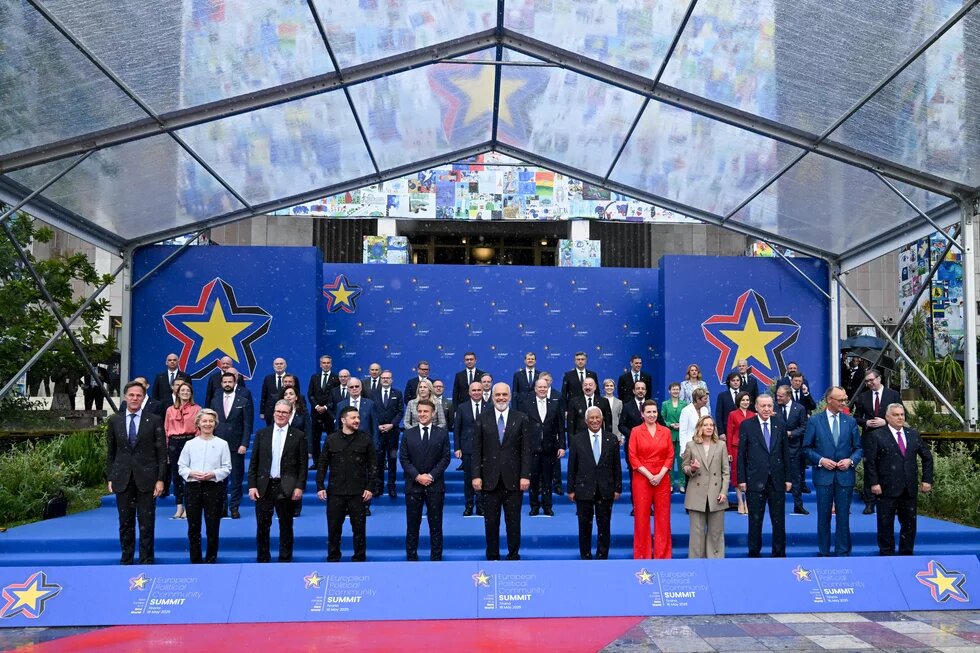As Europe seeks to redefine itself, it was Ukraine that dominated international discussions at the European Political Community (EPC) Summit—despite the fact that, for the first time, the event was hosted in Albania, a Western Balkan country. Very little was said about the region itself, and even that only on the media sidelines.

On 16 May 2025, Albania became the first Balkan country to host a summit of the European Political Community (EPC), an intergovernmental forum established in 2022 by French President Emmanuel Macron to foster political dialogue and cooperation among European countries, both within and outside the EU. The EPC provides a platform for leaders to discuss shared challenges such as energy, security, and migration. It has no formal decision-making powers or institutional structures, but serves as a flexible space for bilateral and multilateral talks.
Two summits are held each year, and this sixth gathering, hosted in Albania’s capital, carried an ambitious title pointing to the soul-searching Europe has undertaken in the wake of the protracted war in Ukraine and the onset of the second Trump administration.
An exuberant host
Although Tirana’s typically warm, sunny skies gave way to rain, the weather didn’t dampen the festive atmosphere ahead of discussions on Europe’s major challenges. Fresh from a sweeping electoral victory for his Socialist Party and firmly in control of a fourth governing mandate, Prime Minister Edi Rama pulled out all the stops to impress his international guests. From traditional music and dance to AI-generated images of European leaders depicted as babbling babies—a touch that sparked laughter across the halls—Rama raised the bar for diplomatic hospitality.
Later, he called for cooperation beyond defence: “We should not only invest in defence, but in the hearts and minds that carry the soul of Europe. Why not imagine an EPC of education, science, and artificial intelligence? An alliance beyond armaments. A source of knowledge, research, and innovation, where non-EU countries become new frontiers,” Rama said.
Ukraine
Support for Ukraine took centre stage. Most public remarks from leaders focused on reassuring President Volodymyr Zelensky of their long-term commitment to his country. As the summit coincided with a new round of negotiations in Ankara, Zelensky called President Putin “a coward” for backing out of a potential meeting. EU High Representative Kaja Kallas and European Commission President Ursula von der Leyen both mentioned a fresh round of sanctions against Russia.
Later, media reported that the leaders of France, Poland, the UK, and Ukraine jointly called President Trump—then visiting Gulf States—from Tirana to discuss strategic options in light of Russia’s recalcitrant position towards the ongoing Ankara talks.
The Middle East
Three key figures—EU’s Antonio Costa, France’s President Macron, and Turkey’s President Erdogan—highlighted the urgency of addressing the humanitarian crisis in Gaza. Erdogan delivered the harshest critique, blatantly accusing Israeli Prime Minister Netanyahu of “endangering everyone.” He praised Trump’s decision to lift sanctions on Syria and urged the EU to do the same. Macron and Costa also stressed that Gaza represents a critical test of the EU’s diplomatic credibility.
Defence and economic security
Economic security stood as a central theme in President Macron’s remarks. He noted that many countries, inside and outside the EU, rely heavily on the stability the Union offers. Emphasising that Europe constitutes a market larger than the U.S. and more influential than China—but hindered by trade barriers—Macron underscored the need for economic resilience.
Striking the same cords, he extended his visit to Albania to participate in a high-level international economic forum, styled after Davos, titled “Invest in a Connected Europe,” attended by business and innovation leaders.
A milestone for Albania, a missed moment for the region?
The EPC has previously served as a platform for informal dialogue on bilateral issues—such as mediating between Armenia and Azerbaijan. But in Tirana, no such ambitions were evident not even lesser ones. No one offered, for instance, to facilitate some fresh dialogue between North Macedonia and Bulgaria, whose dispute continues to stall enlargement progress.
Despite being the first EPC summit hosted in the region, there was no high-level panel dedicated to the Western Balkans.
Not only was the region absent from the formal agenda, it was rarely mentioned at all—typically only in reference to the familiar refrain that its future lies within the EU. On a more hopeful note, some leaders, including Kallas and Macron, expressed optimism regarding Albania’s EU accession prospects, suggesting the next few years represent more than mere possibility.
On the sidelines, when asked about the Kosovo-Serbia dialogue, High Representative Kallas offered only a meek answer in the form of non-news of having appointed a special representative. The most prominent Balkan voice came from Kosovo President Vjosa Osmani, who publicly criticised the EU’s current stance—specifically, its failure to sanction Serbian President Aleksandar Vučić for attending the Moscow Victory Parade, while continuing to uphold punitive measures against Kosovo.
That's it from this time around. Next up in the line of EPC summits: Copenhagen in autumn 2025!
The views and opinions in this article do not necessarily reflect those of the Heinrich-Böll-Stiftung European Union.
This article first appeared here: eu.boell.org